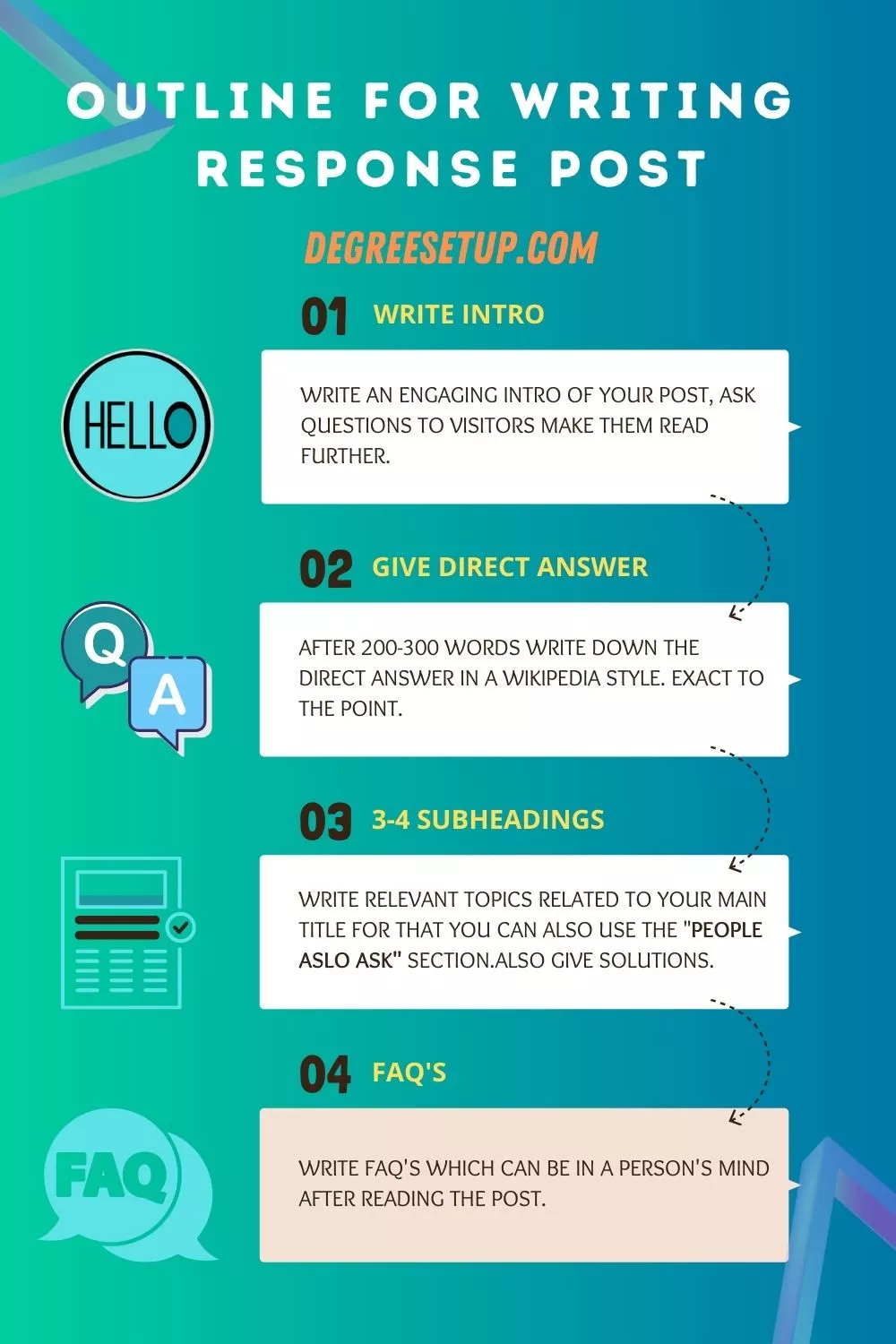
When you start a blog, one of the most important things you must consider is writing content. There are various types of blog posts you start writing as your first piece of content, but if you follow some essential tips, your blog’s chances of getting success will increase.
In this post, you will read about writing response posts and how they will benefit your blog to gain traffic.
Let’s know about this topic in detail so that all your queries and doubts about this get cleared of yours.
Read: Can anyone become a content writer?
What is a response blog post?
A response post is also known as an answer post. The content is written to answer a particular question in between 700 words to 1200 words. This post can rank fast on search engines due to its specificness and brings traffic to your blog.
Response posts come under the short form of blogging content, which can be written on any single topic.
It would be best to focus on writing more response posts during the initial blogging time because it takes less time to rank. Your blog’s chances of getting traffic may increase within a short period.
The idea behind writing the response post is that it covers a small topic that a limited number of people are searching about. Many big websites and blogs do not focus on this. Instead, they are more inclined toward writing highly competitive content.
Response post rule for a new blog.
Degreesetup.com
Read: How can you increase the authority of your blog?
Outline of response post.
Below I have shared an image that you can see and outlined your response post. This is the basic outline that every successful blogger has used in their blog. You can check it out.

Read the below steps and write your first response post.
What are the steps to follow while writing a response post?
To write a response post, follow these steps strictly; otherwise, you will not get better results if you leave any of the steps.
Write an intro.
When you start writing any blog post, ask the question: This does not apply to all blog posts, but it’s better to implement it in your post.
In your intro, write things readers will read further to get a small idea about what’s coming next.
Also, discuss where you got the information and mention the reliable sources in your post by linking them.
- Write a short introduction.
- Engage your readers.
Give a direct answer.
Your answer to the question or response query should be 150-200. As doing so will help you get featured snippets on the first page. If you don’t know about the featured snippets, read this documentation.
Writing direct answers in a response post helps to gain visitors, and also, in a way, you are helping them share the information.
Write subheadings similar to the topic.
Writing a subheading is a must if you are writing any single topic. Make sure not to get diverted and write awkward things in your blog post.
Here are some examples of how you can write a response post about a particular topic.
The title of the post is – how much does it cost to repair an iPhone?
degreesetup.com
1st sub-heading – How much does iphone repair cost in service center?
2nd sub-heading – Can old iphone be repaired?
3rd sub-heading – Various iphone accessories repair cost?
Talk about the solution.
Once the subheadings are done, you can also write about alternative solutions relevant to the topic. If not needed, you can skip this part.
But when you write any content or post, the primary motive is to solve and give relevant answers.
Try to provide options for readers in the blog posts. Don’t be partial to any service or product to earn money from it.
Write FAQ.
Writing FAQs help your blog and website grow if you have seen people also ask section in google. It directly enables visitors to read the specific questions on the SERP pages.
Some searchers may convert into visitors to your blog if they want to know more about a specific topic.
When to write a response post?
Response posts should be written when your blog is new or you have just started blogging. A response or answer post should be written on a specific topic and deep research.
Points to remember when writing response posts.
- Response posts should be written in the first few months of the initial start of the blog.
- Write at least 15 blog posts in 1st month and 30 blog posts in 3 months.
- Produce at least two blog posts in a week and write them consistently.
How does it help?
Response post helps to gain initial traffic on your blog. It may take about a month or two, but writing a particular topic with ample information can make the blog grow faster.
How much time does it take to write a response post?
Writing content online takes time. Writing a response post of 1200 words would take you about 1.5 hours – 2 hours. Writing a response post is divided into five parts, which you can use for your blog benefits.
Writing online content deals with many things, such as.
- Researching – deals with keyword search, competition, and what things you will add to your post to make it unique. This takes about 20-30 minutes for a response post.
- Outlining – Once you research a topic, it’s time to outline your post. The outline includes sub-headings, bullet points, and an FAQ section. It will hardly take you 10 minutes to write your post.
- Writing content – For response in each sub-heading, you can write 300-400 words. You can write 3-4 subheadings quickly in 45 minutes – to 1 hour.
- Proofreading – The last thing to do is proofread. You alone can do this or take help from a friend. Proofreading includes checking spelling errors, punctuation, format, and accuracy of the content. Depending on your content length, this can take about 5-10 minutes.
- Editing content – After writing your content now, you can add images and do other editing work, such as adding alt text in images and minor mistakes, such as correcting the grammar. This takes around 15 minutes.
Watch this video of income school and write your content.
How to optimize a response post for SEO?
Optimizing your post helps your readers to scan it and make your content helpful. Here are some tips that you should apply to your content.
- Write an answer after 200 words of introduction. Helps to generate snippets.
- Use small paragraphs.
- Add images and videos to your content.
- Link out authoritative websites.
- Do internal linking with similar content.
These are essential yet powerful practices for writing SEO content in your blog.
Conclusion
All these things I have learned from watching and practicing on my own. There are many courses on the digital platforms on the internet, but the best thing that can teach you blogging is you.
The response post is just a start if you want to become a Professional Blogger. There are more things you will find ahead on this platform, so make sure to visit again for more exciting content about online marketing on degreesetup.com.
FAQs related to a response post
How much time does it take for a response to get indexed?
If the content is new with low competition and high search volume, it takes a few days to weeks to get indexed on search engines.
How many types are response posts are there?
Response posts contain – QNA, informational, and research posts.
Why is response posts better?
Response posts are better because they are targeted at a specific answer, and the chances of ranking are higher.
How many blog posts to write for a new blog /website?
Start writing 15-20 blogs on a new blog website with low-competition keywords.



Great by all means and a very informative blog. I’ve learned something new today, keep up the good work!